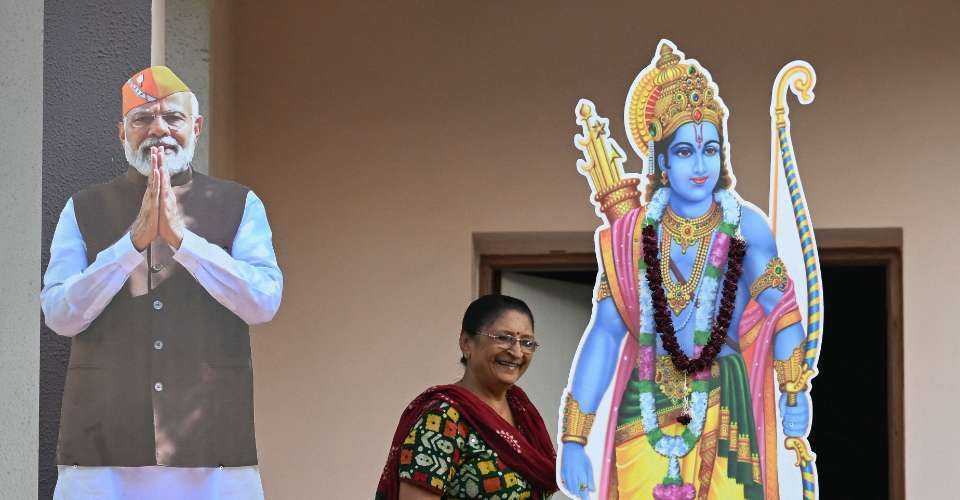
A woman stands on the balcony of a residential building with cut-outs of India’s Prime Minister Narendra Modi and Hindu god Ram, in Ahmedabad on May 6. (Photo: AFP)
There is a growing sentiment within India’s ruling Bharatiya Janata Party (BJP) and its substantial support base that “secularism,” as practiced in the nation, is essentially “anti-majority.”
Marx described religion as the “opium of the masses,” and this is largely considered a truism globally. In South Asia, and especially in India, people of all beliefs are deeply religious, often outdoing each other in worship, whether in temples, mosques, or churches.
No wonder religion invariably crops up during the election season in India, where Prime Minister Narendra Modi is seeking a third consecutive term.
Modi is banking heavily on Hindutva (literally “Hindu-ness”). This political ideology advocates for Hindu supremacy and seeks to transform India, constitutionally a secular state, into an ethno-religious nation.
As polling progresses — the third of a seven-phased election was held on May 7 — candidates and workers of Modi’s BJP are seen increasingly relying on the party’s familiar tactic of seeking votes by evoking inherent religious divisions in the country of 1.4 billion people.
“Prime Minister Modi likes to call India the ‘mother of democracy,’ but he misses the point that sheer communalism is a strict anti-thesis to religion,” says political analyst Ramakanto Shanyal from West Bengal.
He feels the prime minister “should be held more guilty on this than the others.” Still, on the other hand, the main opposition Congress, in the name of secularism and protecting the rights of minorities, also plays the religion card in more ways than one.
The can of worms was opened by Modi himself when he dubbed the Congress party’s election manifesto as “a footprint of the Muslim League,” which is held responsible for the partition of the Indian subcontinent to create Pakistan.
The bitterness over Pakistan exists in India even in normal times and is often tapped during elections by the BJP leadership and poll managers to garner votes.
Modi further claimed that Congress is planning to re-distribute the wealth of wealthy and upper-middle-class Hindus to Muslims, who he called “infiltrators” who have “many children.”
Guwahati-based pollical observer Ashutosh Talukdar said that when Congress leader Rahul Gandhi announced at an election rally that his party would survey the lower backward classes, Dalits, tribal people, minorities, and the poor to ensure them a share in the country’s progress, many linked it to pandering to “Muslim interest.”
Thus, the Pakistan angle and repeated reference to Muslims was an attempt to polarize the Indian election, causing further religious divides among the electorate.
Things got further complicated when a Pakistani leader, Chaudhry Fawad Hussain, applauded Gandhi, saying the Congress leader, like his great-grandfather and India’s first prime minister Jawaharlal Nehru, had a socialist in him.
Congress leaders tried to wriggle out of the tight spot by saying that, like in India, where a few families owned most of the country’s wealth and resources, in Pakistan too, a business club called the Pakistan Business Council and a few real estate tycoons own 75 percent of the wealth.
Gandhi, seen as Modi’s primary challenger, has been stressing the fair distribution of wealth as “the biggest challenge of capitalism” in his election pitch.
But the BJP is latching on to the praise from a Pakistani politician to diffuse the challenge posed by him to Modi.
Federal Minister for Defense Rajnath Singh said, “There must be a reason behind this deep love [for Rahul Gandhi] from a country that has been trying to destabilize India. It is a matter of grave concern, and India wants to know the reason for this love.”
The pro-Hindu party also mocks him for contesting from the Wayanad parliamentary constituency in southern Kerala state, where Muslims form 29 percent of the electorate, giving a communal color to his mission of reviving the Congress’ electoral fortunes.
Modi’s biggest electoral strength remains his Hindutva support base. On May 5, he offered prayers at the Ram temple in Ayodhya, built on the spot where the medieval-era Babri mosque was demolished in 1992.
Modi consecrated Ram’s statue in the newly built grand temple on Jan. 22, marking a symbolic end of the Nehruvian project to keep the state separate from religion in the public sphere.
With this general election, the results of which will be out on June 4, he will be hoping to deal another blow to Congress’ brand of “secular” politics.
source : uca news
